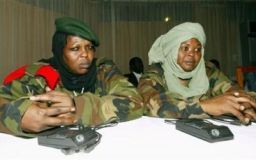Darfur talks continue, deadline nears
May 04, 2006 (ABUJA) — Top envoys sent from Washington and London worked against a Thursday midnight deadline to persuade Darfur’s warring parties in Darfur to sign a peace pact.
 As the talks progressed, U.N. humanitarian chief Jan Egeland was heading to Darfur. Last month, the Sudanese government barred Egeland from visiting Darfur and its capital of Khartoum. But the U.N. envoy said in an interview Wednesday that the government has now invited him and he will visit this weekend.
As the talks progressed, U.N. humanitarian chief Jan Egeland was heading to Darfur. Last month, the Sudanese government barred Egeland from visiting Darfur and its capital of Khartoum. But the U.N. envoy said in an interview Wednesday that the government has now invited him and he will visit this weekend.
He said his trip has three objectives: to improve security for relief workers and the people they are trying to help, to try to get more cooperation from the government and rebels for humanitarian work, and to appeal for immediate funding, he said. Cash-strapped aid agencies are drastically cutting services for more than 2 million people forced from their homes by the fighting.
If the Abuja talks fail to resolve a crisis that has claimed at least 180,000 lives, “it could get much worse, and we are unarmed humanitarian workers, so we cannot sustain it if we are attacked,” Egeland said.
In Abuja, the Nigerian capital that has hosted Darfur peace talks for two years, negotiations went late into the night Wednesday. U.S. Deputy Secretary of State Robert B. Zoellick met President Olusegun Obasanjo, a key figure in peacemaking efforts across Africa. British Cabinet member Hilary Benn also was in Abuja for the talks.
African Union mediators had set a Sunday deadline for the two sides to accept their original draft, but extended that twice after meeting rebel objections. The latest deadline was midnight (2300GMT) Thursday.
Sudanese government spokesman Abdulrahman Zuma said Wednesday his government was considering agreeing to faster disarmament of Arab militias in Darfur and accepting more rebels into its security forces, key concessions included in a revised peace agreement drafted with the help of Zoellick and Benn.
“Through this so-called American initiative, it seems that the government is going to make some concessions, especially about reintegration and disarmament,” Zuma told the Associated Press.
The initial draft called for disarmament of the Arab militias known as Janjaweed, but did not specify how quickly that would accomplished, nor specify how many rebels would be absorbed into national security forces.
No details were available on the timetable or numbers laid out in the revised plan and how they might compare to any understandings on those two points that may have been made but not spelled out in the original draft.
Two Sudanese rebels close to the negotiations offered a different version, saying Zoellick and Benn were preparing a substantially changed proposal to address their demands for greater power and wealth sharing. The rebels spoke on condition of anonymity because the new proposal was not official.
Zuma said the power and wealth sharing issues already had been settled and were not open to discussion.
Earlier, Jaffer Monro, spokesman for the main Sudan Liberation Movement, had said that if the initial proposal was not significantly changed, the rebels would press for the United Nations or another body to take over the peace talks. The African Union has overseen the talks for two years, and its mediators have often expressed frustration at the seeming unwillingness of either side to compromise or adhere to a cease-fire declared in April, 2004.
African Union spokesman Nouredine Mezni said African mediators had made “titanic efforts” to produce the draft proposal and that any changes would have to be negotiated by other parties.
The U.S. and British officials stepped into that breach. They were sent to Abuja after thousands of Americans including several legislators protested over the weekend to demand an end to the slaughter in Darfur.
While the rebels may embrace the United States as an alternative to the African Union, the U.S. relationship with Khartoum is complicated.
On Friday, Washington counted Sudan among six state sponsors of terror, even while it credited Khartoum with taking significant steps to cooperate in the global war on terror.
The U.N. Security Council a year ago authorized seizure of assets and a travel ban on individuals defying peace efforts or violating human rights law in Darfur. Those sanctions were imposed for the first time last week against a commander of the Sudanese air force, a Janjaweed militia leader and two rebel commanders.
Stakes in the conflict have increased with oil exploration in Darfur. China, whose single largest source of foreign crude is Sudan, initially opposed and then abstained from the U.S.-backed resolution imposing sanctions.
Decades of low-level tribal clashes over land and water in Darfur erupted into large-scale violence in early 2003, with rebels accusing the central government of neglecting the region. The central government is accused of responding by unleashing Arab militias known as Janjaweed upon civilians. Sudan denies backing the Janjaweed.
Darfur has become a staging ground for Chadian rebels, who have risen up against the government there, and Sudan accuses Chad of supporting Darfur rebels. The violence threatens to escalate since Osama bin Laden last week urged his followers to go to Sudan to fight a proposed U.N. force to replace ineffective African peacekeepers.
(ST/AP)
